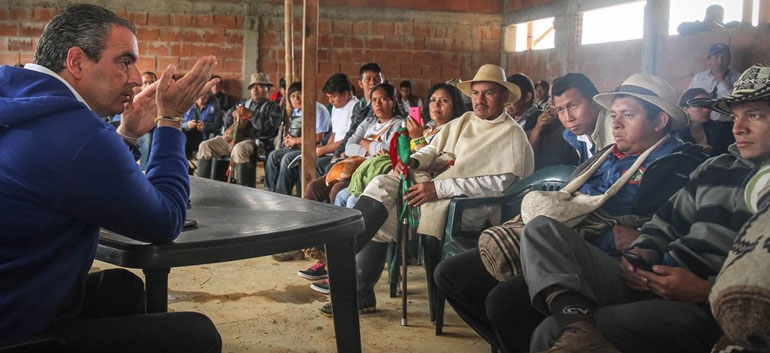Indigenous organizers have reached a “historic” 25-point agreement with the government over territorial and human rights, granting Colombia’s native communities increased judicial, administrative and political autonomy, among other terms.
The agreement follows a national strike, titled “La Minga,” that was lifted last week when indigenous leaders of the National Indigenous Organization of Colombia (ONIC) entered into dialogues with the government of President Juan Manuel Santos to address ongoing economic injustices and human rights abuses facing Colombia’s underrepresented native populations.
MORE: Colombia’s indigenous unblock roads after talks with govt
According to local media, Minister of the Interior Irragorri Valencia celebrated the agreement, which will honor constitutional rights of indigenous communities to political autonomy and independent resource management set by Colombia’s 1991 Constitution.
“We have achieved what we consider a historic agreement that follows through on constitutional obligations that have not been obeyed for the past 22 years in Colombia,” said Irragorri. “We are affirming article 56 [of the Constitution], turning the desire of the indigenous people to have true independence and autonomy into reality.”
The agreement also plans for the government to make available a fund of $42 million to buy lands that had been expropriated from the indigenous people in years past.
A representative from ONIC head-adviser Luis Fernando Arias’s office, who wished to remain anonymous, said the signing of the agreement “could be classified as historic” due to the fact that Colombia’s indigenous communities had been waiting for 100 to 150 years for the political rights granted “in a specific manner” by Colombian government in the agreement.
The ONIC representative said that the recent strikes and roadblocks, which received violent responses from police in areas various sectors, along with indigenous organizing across the country, were crucial in convincing the government to sit down to the negotiating table, eventually yielding “results to the indigenous people’s demands.”
“The street has always been a manner in which we have shared the vision and grievances of the indigenous people’s communities,” said the ONIC representative. “Also, the permanent presence of indigenous community councils in 19 states and 25 municipalities, I believe was one of the main points that made the government sit down to negotiate.”
MORE: Colombia’s indigenous decry excessive police force against protesters
He said the 25 point agreement had satisfied most of the indigenous groups’ five major point platform of demands: the right to prior consultation before granting approval to a project in their territory; the suspension of mining titles in these areas, the defense of human rights in the context of armed conflict; a reevaluation of economic and agricultural policy; and political, legal and administrative autonomy for their communities.
However, he said there were three points left to be settled: agreement on political structures to return colonial lands taken from indigenous peoples over history; a manner to deny mega-mining projects on indigenous lands; and renegotiation of free trade agreements signed with foreign nations.
ONIC in a press release said the agreement does not signify the end of the indigenous organizing of “La Minga,” calling on all “to to become acquainted with, make demands, and involve themselves to ensure the government follows through on its promises.”
Sources
- Interview with ONIC representative
- Acuerdos entre el Gobierno Indígena de la ONIC y el Gobierno Nacional (ONIC press release)
- Gobierno Nacional cumple deuda histórica con indígenas del país (Minister of Interior)
- Levantada minga indígena en Colombia tras acuerdos con el Gobierno (Telesur)
- Indígenas del Cauca y Gobierno llegaron a un acuerdo (Radio W)


